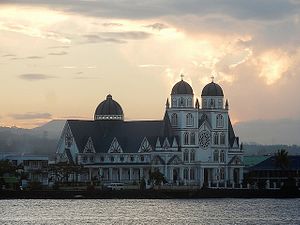In early June, the Samoan Parliament passed a bill amending the constitution to transform the country from a secular to a Christian state. The objective of the amendment was “to insert in the Constitution that Samoa is a Christian nation to declare the dominance of Christianity in Samoa.” Of the Parliament’s 49 representatives, 43 voted in favor of the bill.
Samoa already had a reference to Christianity in the preamble to its Constitution, which declared that the Samoan government should conduct itself “within the limits prescribed by God’s commandments,” and that Samoan society is “based on Christian principles.” This kind of wording is common in the preambles of constitutions among Pacific Island states (the exception being Fiji). However, a preamble to a constitution is generally seen as a broad symbolic national statement, one of historical or cultural significance, rather than a legislative tool. What Samoa has done is shift references to Christianity into the body of the constitution, giving the text far more potential to be used in legal processes.
Previously Article 1 of the Samoan Constitution had declared that “Samoa is founded on God,” a broad religious conception that could be applied to all religious groups (a phrasing similarly used by Indonesia). However, upon these changes Article 1 will now read “Samoa is a Christian nation founded of God the Father, the Son and the Holy Spirit,” a specifically Christian conception of God, with no room for interpretation by other religious groups, or by the government and judiciary.
The motivation for this constitutional shift seems to be twofold. First, the change seems to be driven by a fear of Islam within Samoa, with the Secretary General of the Samoa Council of Churches, Reverend Ma’auga Motu stating that Islam should be banned from the country. This coincides with what Prime Minister Tuilaepa Malielegaoi sees as “religious wars” currently playing out at a global level, and that these are leading to civil wars within countries. The prime minister said that the suspected reason Christianity wasn’t enshrined in the body of the constitution was that there were no religious wars when the constitution was written in 1960, and that “perhaps our ancestors were not thinking about it at the time.”
Tuilaepa believes that it is now the government’s duty to legislate to avoid religious tensions. This line of thinking indicates that it is the secular state that provides the environment for religious tensions to ferment, and that a country which legally enshrines a religion will avoid creating these tensions.
What makes this more interesting is that the likelihood of any radical Islamic elements with the organizational capacity to create tensions in Samoa is extremely remote. The 2001 census counted the followers of Islam to be 0.03 percent of the Samoan population, or 48 people. Although religious numbers haven’t been counted in subsequent censuses, it’s unlikely that the figure has increased too much beyond this. The country has only one mosque that is very modestly attended.
What the constitutional changes therefore do create is the potential for the country’s tiny Muslim community to feel very unsettled, especially if these constitutional changes are used to limit their freedom to worship, and they lack the capacity within the community to legally defended themselves. The equally small numbers of Hindus, Buddhists and Jews may also feel a similar unease.
The second motivation for the change in the constitution seems to be one of preventing outside forces from advocating for modern cultural change within Samoa. In January when the changes were being discussed members of Parliament declared that Samoa becoming a Christian state would mean that it would not be influenced by other states, or NGOs, that may pressure it to adopted ideas like gay rights. In parliamentary debates, one member of parliament expressed this perspective by stating, “If we make laws and bills, we need to make decisions that will reflect that we are a Christian country, so if other countries push us to make laws such as to allow same sex marriage, then we have to say no because that will not show that we are a Christian country. That will never happen in Samoa.”
Aside from attempting to insulate the country from outside influences that are perceived to be unstable or unfamiliar, there remains the potential for more theocratic tendencies to emerge from these constitutional changes. Those who hold the interpretations of God’s will in Samoan society may now also hold a far greater legal sway. Churches lobbying the government for both their own tangible interests, or causes they consider of importance, will now have the state’s foundation’s document on their side.
This has the further potential to create a denominational rivalry for influence over the state. While 98 percent of Samoa’s population identify as Christian, there is a range of varying doctrine within the country from the evangelical Congregational Christian Church of Samoa, a large number of Roman Catholics, a strong recent increase in Mormons (15 percent of the population and rising), as well as the Pentecostal Assemblies of God, and the Methodist Church.
While being motivated by attempts to ward off outside influence and prevent any religious tensions from fermenting in the country, this change to the Samoan Constitution could have the potential to actually create religious tensions if each Christian denomination cannot agree on the theological interpretations of the government’s legislative agenda.

































